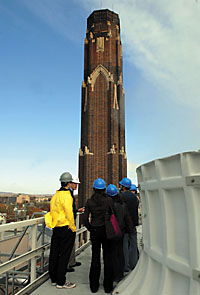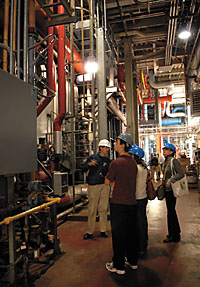 | Members of the Northeast Campus Sustainability Consortium tour Yale's cogeneration power plant. |
John Bollier believes that setting a goal that is easy to attain is not the way to inspire others to action on the environment.
"If you want to be a leader, there is going to be risk," Bollier, Yale's associate vice president of facilities operations, said of the University's ambitious goal to roll back its greenhouse gas emissions by 10% below 1990 levels by the year 2020, all while the University will continue to grow.
Bollier's remark came during the recent conference of the Northeast Campus Sustainability Consortium. Julie Newman, who came to Yale to head its sustainability efforts in 2004, founded the consortium and brought its annual meeting to Yale this year to discuss institutionalizing sustainability in higher education. The 150 participants at the conference also included representatives from seven countries in addition to the United States and Canada.
Yale's guests were welcomed by President Richard C. Levin, who said that a strengthened commitment to the environment was one of the priorities Yale adopted at its Tercentennial in 2001.
"We've managed to come a very long way in a short time," said Levin, while acknowledging that Yale, and the industrialized world, is not as far along as it needs to be.
Levin listed Yale's adoption of a set of environmental principles, the recruitment of Newman and the establishment of sustainability committees -- comprised of faculty, staff and students -- on key environmental issues as evidence of an encouraging trajectory at Yale.
He also noted that Yale had recently earned a "gold" certification for the new Malone Engineering Center from the U.S. Green Building Council, which developed the Leadership in Energy and Environmental Design (LEED) rating system that is a nationally recognized benchmark for the design, construction and operation of high-performance green buildings. A new home for the School of Forestry & Environmental Studies (F&ES) has been designed, and Levin said the building is expected to earn the highest, or "platinum," LEED certification.
"We are going to seek LEED certification for every one of them," Levin said of other new campus buildings.
Discussing Yale's greenhouse gas reduction target, Levin said it would require the University to achieve emissions 43% below what Yale would be estimated to generate in 2020 without a reduction plan. He said significant progress was made in the first year following the target's adoption and suggested that, while that goal may not be realistic for all institutions, establishing some environmental goal was necessary to spur progress.
Leigh Sharp, a representative from Harvard University, told Levin that, through Yale's ambitious goal, "You've made our job easier by stepping forward."
After touring Yale's energy-efficient cogeneration power plant, the garden of Yale's Sustainable Food Project and other aspects of campus related to the sustainability effort, the visitors explored issues including cutting greenhouse gas emissions on campus, engaging students in environmentally sustainable behavior, transportation strategies, facility design and construction, and recycling.
"There is no silver bullet," Bollier said in describing Yale's multi-faceted emissions-reduction strategy that includes on-campus energy conservation through technological advances and behavior change and the purchase of energy from renewable sources. Bollier said Yale's goal was a "recognizable" one that could spur other institutions to act, rather than a plan that was too specific to Yale to be emulated. He also said that Yale's action was an effective way to channel student zeal for efforts toward conservation. Undergraduates have responded by reducing energy consumption in the residential colleges.
Yale faculty, students and recent graduates were among the conference participants. Gus Speth, dean of F&ES, and Daniel Esty, the Hillhouse Professor of Environmental Law and Policy, delivered keynote addresses. Kate Hamilton, a 2006 graduate of F&ES, led the student effort last spring to offset the carbon dioxide emissions associated with the school's commencement ceremony, including those emissions produced by proud families traveling to New Haven for the celebration. The offsets included solar energy produced in Nigeria. Noting that many colleges and universities are exploring ways to offset the greenhouse gas emissions they produce on their campuses, Hamilton told conference attendees about the various options that exist, including the long-term storage of carbon, or "carbon sequestration," in the environment.
Newman said every attempt was made to reduce the environmental impact of the conference itself, and Levin suggested that visitors ride the Yale shuttle bus system powered by a blend of ultra-low sulfur diesel and biodiesel that is indistinguishable from dirtier fuel.
"You won't be able to tell," Levin said.
T H I S
College leaders come to learn
from Yale's sustainability goals

Since 1998, Yale's Central Power plant has been creating both
steam to heat campus buildings and electricity to power them in an energy-efficient and
environment-friendly manner. It is just one component in Yale's effort to create a
sustainable campus. Another, more recent project was the Malone Engineering Center, which has received a "gold" certification from the U.S. Green Building Council.
"We're deeply committed to achieving that goal," he said. "Whether you can meet that stringent a goal or not, establish one that is appropriate."
 W E E K ' S
W E E K ' S S T O R I E S
S T O R I E S![]()
 College leaders come to learn from Yale's sustainability goals
College leaders come to learn from Yale's sustainability goals![]()
![]()
 Trachtenberg to step down at year's end
Trachtenberg to step down at year's end![]()
![]()
 Sherwin: Broader research approach needed today
Sherwin: Broader research approach needed today![]()
![]()
 Doctoral students are honored for their 'inspiring teaching'
Doctoral students are honored for their 'inspiring teaching'![]()
![]()
 ENDOWED PROFESSORSHIPS
ENDOWED PROFESSORSHIPS
 Yochai Benkler named inaugural Field Professor
Yochai Benkler named inaugural Field Professor![]()
 Oswald Schmitz has been named to Oastler chair
Oswald Schmitz has been named to Oastler chair![]()
 Henry Smith appointed to Johnston Professorship
Henry Smith appointed to Johnston Professorship![]()
![]()
 School of Music announces two senior administrative appointments
School of Music announces two senior administrative appointments![]()
![]()
 Yale's World Performance Project will help launch . . .
Yale's World Performance Project will help launch . . .![]()
![]()
 Like father, like son: Yale tackle named NFF Scholar-Athlete
Like father, like son: Yale tackle named NFF Scholar-Athlete![]()
![]()
 Students help in the fight against hunger via a silent auction
Students help in the fight against hunger via a silent auction![]()
![]()
 SCHOOL OF MEDICINE NEWS
SCHOOL OF MEDICINE NEWS
 Study finds link between HIV/AIDS and drug-resistant tuberculosis
Study finds link between HIV/AIDS and drug-resistant tuberculosis![]()
 Researchers implicate a protein in acute lung injury in children . . .
Researchers implicate a protein in acute lung injury in children . . .![]()
 People often use food to cope with weight bias, study finds
People often use food to cope with weight bias, study finds![]()
 Team describes structure of enzyme linked to Alzheimer's disease
Team describes structure of enzyme linked to Alzheimer's disease![]()
![]()
 In Memoriam: William A. Creasey
In Memoriam: William A. Creasey![]()
![]()
 Book awards benefit area high school students and their school libraries
Book awards benefit area high school students and their school libraries![]()
![]()
 Campus Notes
Campus Notes![]()
Bulletin Home |
| Visiting on Campus
Visiting on Campus |
| Calendar of Events
Calendar of Events |
| In the News
In the News![]()
Bulletin Board |
| Classified Ads
Classified Ads |
| Search Archives
Search Archives |
| Deadlines
Deadlines![]()
Bulletin Staff |
| Public Affairs
Public Affairs |
| News Releases
News Releases |
| E-Mail Us
E-Mail Us |
| Yale Home
Yale Home